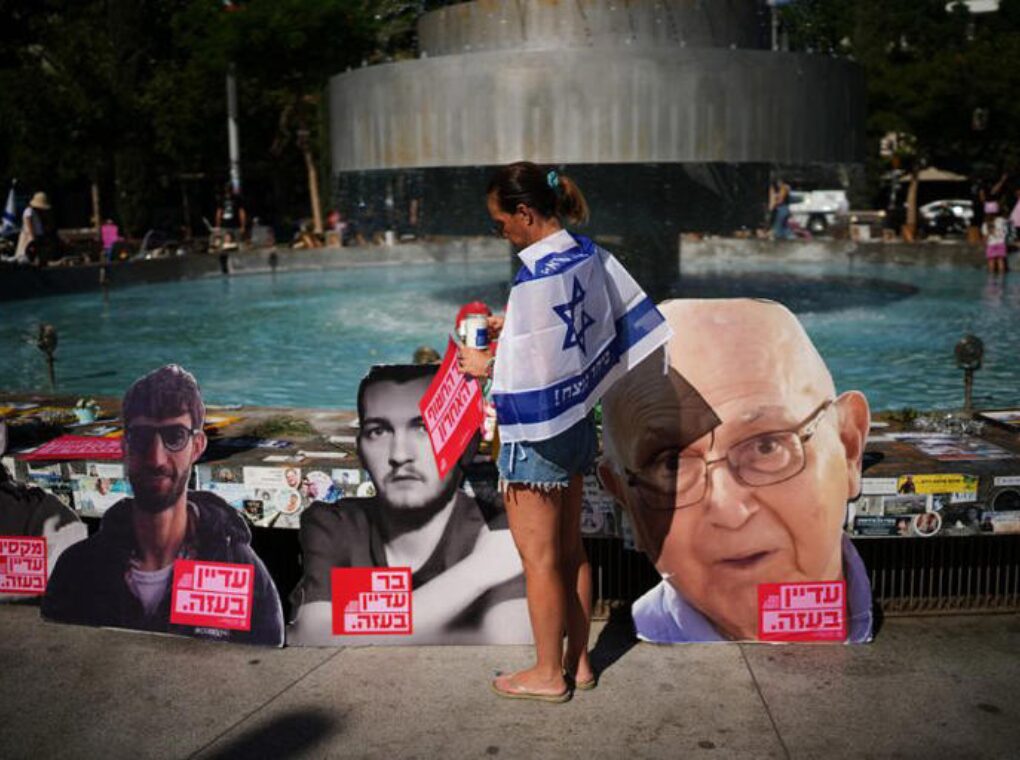Two years after the devastating Hamas-led assault that changed Israel forever, thousands gathered across the country on Tuesday to mourn, remember, and plead for an end to the bloodshed that still grips the region. The commemorations, held amid renewed violence and political tension, served as both a memorial and a collective cry — “Enough.”
Remembering the Morning of Horror
At dawn, the border community of Reim, home to the Nova music festival, fell silent at exactly 6:29 a.m. — the moment when Hamas militants launched their surprise attack on October 7, 2023. What began as a morning of music and dance two years ago ended in unimaginable horror. Nearly 400 festivalgoers were killed and dozens abducted, marking one of the darkest chapters in Israel’s history.
In Tel Aviv, hundreds gathered with candles and photographs, the air thick with grief and resilience. Among them was Shiri Tamam, an Israeli-Canadian who lit a candle in memory of her friends lost that day. “It’s been two years,” she said softly, “but the pain hasn’t aged a day.”
The Nova site itself has become an impromptu memorial — portraits of the kidnapped and fallen line the area where music once played. Survivors and bereaved families hugged, cried, and shared stories, the sounds of artillery from Gaza faintly audible in the distance — a grim reminder that the war it ignited still rages on.
“Every Day, We Relive It”
Alon Muskinov, 28, who survived the attack but lost three close friends, said the trauma is still raw. “We are reliving this every day anew,” he said. “Every morning we wake up, we remember them.”
For Yehuda Rahmani, who lost his daughter Sharon, a police officer killed while defending others at the festival, the site has become a sacred space. “I come here every day,” he said, “to stand where she stood last. I still hope someone will tell me how she spent her final moments.”
Rahmani’s grief is intertwined with anger. “Two years, and still no inquiry, no answers,” he said. “When you don’t know what happened, it makes it so much harder.”
A Nation in Mourning — and in Protest
This year, Israel’s government chose not to hold a state ceremony on October 7, as the date coincides with the Jewish festival of Sukkot. Instead, bereaved families organized independent memorials — both to honor their loved ones and to express frustration with the government’s handling of the war and the hostage crisis.
In Tel Aviv’s main square, relatives of hostages still held in Gaza marched with posters bearing the faces of their loved ones. Their message was direct: “Bring them home.”
Shay Dickmann, who lost her aunt in Kibbutz Be’eri and whose cousin Carmel Gat was taken hostage and later killed in Gaza, urged leaders to act. “There is a deal on the table,” she said. “There is an opportunity to end this war and bring everybody back home. We all deserve peace — us and our neighbors.”
Echoes of War in Gaza
Even as Israel mourned, explosions echoed from Gaza, and smoke could be seen from the southern border. The Israeli army reported a rocket launched from northern Gaza, though it caused no injuries. In the West Bank and East Jerusalem, Israeli forces arrested at least 35 Palestinians in what they called “regular counterterrorism activity.”
On the other side of the border, the pain is just as deep. In Gaza, Yareen Abu Naja, a 44-year-old mother of three, said she spends her days searching for food and shelter. “Enough of this injustice and indignity,” she said through tears. “Enough of this war.”
According to humanitarian groups, tens of thousands of Gazans have died since the Israeli military launched its campaign following the 2023 attacks. Entire neighborhoods have been reduced to rubble. “The last two years have felt like a hundred,” Abu Naja said.
Netanyahu Under Fire
Prime Minister Benjamin Netanyahu faces growing criticism both at home and abroad. Polls show a majority of Israelis want the war to end, and thousands continue to march in Tel Aviv and Jerusalem demanding a hostage deal and peace talks.
Yet within his coalition, far-right ministers threaten to collapse the government if Netanyahu agrees to a ceasefire that leaves Hamas in control of Gaza. The resulting deadlock has paralyzed decision-making and deepened public frustration.
Internationally, Israel’s isolation is mounting. Allies and neighboring states are pressing for a permanent political solution — one that includes a pathway toward a Palestinian state. Human rights organizations have accused Israel of using disproportionate force in Gaza, with some labeling its military campaign as “genocidal”, further straining relations with Western partners.
Hints of a Peace Deal
Despite the despair, there are faint signs of hope. In recent days, Hamas reportedly indicated willingness to consider a U.S.-brokered peace proposal — said to be part of former President Donald Trump’s 20-point plan — that includes the release of all remaining hostages.
Israel believes 48 hostages remain in Gaza, about 20 of them possibly alive. The families of the missing cling to any sign of progress, even as negotiations in Cairo, Egypt, drag on.
A Call Heard Across Borders
At dawn in Kfar Aza, one of the hardest-hit communities in 2023, Pnina Russo stood before a memorial for her son Uri, an engineer who died defending the kibbutz. “He was beautiful, smart, wonderful,” she said, her voice trembling. “I miss him every day.”
But Russo’s grief, like that of so many others, is mixed with exhaustion — not just from loss, but from division. “Two years of war is something terrible, terrible, terrible,” she said. “It’s not only the fighting — it’s the hatred between our people. It has to change.”
As night fell, the candles in Tel Aviv flickered in the wind, their glow reflecting both mourning and defiance. From Gaza to Israel, from ruins to rallies, the same message echoed across borders and beliefs — a desperate plea from the human heart:
“Enough of this war.”
